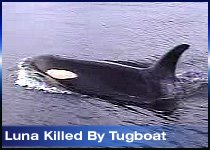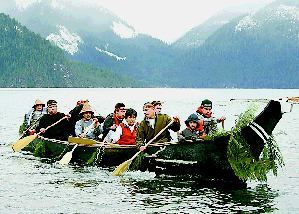Luna, the Killer Whale Who Loved People, Is Killed by Tugboat off Vancouver Island

"I'd rather see him live a short and free life rather than a long and captive one."
-- Keith Wood, Act Now for Ocean Natives
Luna, the playful orca who for the past five years had delighted whale-watchers and confounded fishermen in Nootka Sound off Vancouver Island, is no more. His blithe spirit was permanently stilled on March 10th when he was struck and killed by an American tugboat that was pulling a barge loaded with logs. The black and white whale was sliced to pieces when he came into contact with the vessel's powerful propeller; sea gulls feasted on his remains.
Ironically, Luna (See photo above) was killed by what might be called "friendly fire" since he and the crew of the General Jackson were old friends. In fact, just before he met his untimely death, he had been fetching sticks for the crew while they photographed him. Barry Connerty of Great Northern Marine Towing of New Westminster, owner of the General Jackson, told the Vancouver Sun on March 14th that the six-year-old whale behaved like a stray dog seeking companionship whenever any of his boats came near. Sometimes he even assisted the boatmen by pushing logs into bundles. "He'd go right beside the boom boat and boom the log. He'd just hang around. He was just interested in seeing what everybody's doing," Connerty fondly recalled.
Luna, known to scientists as L-98 because he was the ninety-eighth member of the L-pod, was born on September 19, 1999 near the San Juan Islands off Washington State. For some unknown reason, he became separated from his pod and was discovered all by his lonesome in Nootka Sound in 2001. Deprived of the companionship of his fellow orcas, Luna soon developed an affinity for people and boats and it was this attraction which ultimately cost him his life. Even before his fatal encounter with the General Jackson cuts were starting to appear in his skin as the result of run-ins with propellers.
As this life and death drama was being played out over the past few years, Luna's friendliness engendered a slew of complaints from the operators of seaplanes and fishing boats. In particular, he was known to have peeled off the underwater transponders from a number of fishing boats because the radar emitted by fish finders and depth sounders not only irritated him but no doubt interfered with his ability to hunt salmon. Nonetheless, if the moneygrubbers viewed him as an impediment to their shekel accumulation efforts, whale-lovers adored him and he soon became famous all over Canada. He was even featured in several news reports by the CBC's As It Happens. He made his most enduring impression, however, on the First Nations tribe known as Mowachaht-Muchalaht.
When Luna first appeared in Nootka Sound it was three days after their chief, Ambrose Maquinna, had died. Before dying, the chief had oddly enough predicted that he would come back as a kakawin and the tribe believed Tsu'xiit, their name for Luna, to be the embodiment of the spirit of their dead chief. They accordingly tried to watch over him in their canoes.
In June of 2004, Fisheries and Oceans Canada (DFO), the Vancouver Aquarium, and the U.S. National Oceanic and Atmospheric Administration (NOAA) attempted to capture and move Luna to Puget Sound where it was hoped that he would be able to link up once again with his pod. Their efforts were thwarted, however, by tribesmen who spent nine days on the water protecting the whale from his would-be captors and the relocation effort was abandoned. Earlier in 2002, Canadian and American officials had successfully reunited another orca, Springer or A-73, with her pod after she had wandered into Puget Sound.
Luna's decision to take up residence in Nootka Sound dumbfounded officials and they were never quite able to recover from their stupor. Even the relocation effort was controversial. Keith Wood of Act Now for Ocean Natives told Mark Hume of Toronto's Globe and Mail on March 13th that relocating the orca to Puget Sound may not have worked. "It's not clear at all that had Luna been captured that he would have been released, that he would have survived the capture itself, or that he would have been reunited with his family." (See "Another Whale's Drop in a Toxic Ocean.") Wood further pointed out that Puget Sound is one of the busiest harbors on the West Coast and that Luna might very well have been in even greater danger there than in Nootka Sound. Back in January, rescuers in London killed a whale in a misguided rescue attempt. (See Cat Defender post of January 30th entitled "Female Northern Bottlenosed Whale Dies in the Thames After a Botched Rescue Attempt.")
As for reports that Luna was going to be confined to an aquarium if captured, Wood replied, "I'd rather see him live a short and free life than a long and captive one."
On March 13th, one-hundred-thirty members of the Mowachaht-Muchalaht tribe gathered in Gold River to remember Luna. Songs were sung, prayers offered, and tribesmen in a canoe spread sacred cedar boughs on the water (See photo below). "Since time immemorial we've stood by each and every animal and living thing within our territory," new chief Mike Maquinna told the gathering. "For the past few years, we've been honored by the presence of the whale. We have a lot to be proud of as Mowachaht-Muchalaht people, for upholding our beliefs of letting nature take its course, and keeping Tsu'xiit free." (See the Westcoaster, March 16, 2006, "Mowachaht-Muchalaht Mourns Loss of Luna.") A larger commemoration is scheduled for July and Suzanne Chisholm and Mike Parfit of Mountainside Films are preparing a documentary on Luna.

As Hume points out in the Globe and Mail article cited supra, Canadians have a long history of abusing killer whales. For instance, in the 1940s the Canadian Air Force used orcas in the nearby Strait of Georgia for target practice. Fisherman have shot them in order to keep them from eating salmon and aquariums have imprisoned many more of them. As horrific as all of this was, orcas today face even greater dangers, such as collisions with ships, entanglement with fishing nets, oil spills, eardrum-splitting sonar and, above all, pollution. In particular, Hume points out that the level of toxic chemicals found in killer whales is three times higher than those known to cause immunotoxicity in harbor seals. Immunotoxicity could make orcas more susceptible to diseases, cancers, and sterility.
The only way that orcas and other marine life can survive is for man to stop using the oceans as giant garbage dumps. Fishing needs to be curtailed and drag nets outlawed. Ocean noise, including sonar, must be reduced. With Luna's tragic death, only eighty-nine orcas, or southern residents, remain in the area bounded by Vancouver Island in the north and Puget Sound in the south and, based upon the amount of boat traffic and pollution in the water, their prospects do not look particularly encouraging.
The saddest part of this tragedy is that Luna need not have died. If relocating him was not feasible, maritime officials should have declared Nootka Sound to be off limits to propeller-driven boats. The life of this friendly whale was surely worth a lot more than the petty commercial interests of a few greedy capitalists. By refusing to take the necessary steps to ensure Luna's well-being, Canadian officials killed him just as certain as if they had harpooned him.
"He touched a lot of lives and he really brought our community together," tribesman Kelly John, who can be seen in a video petting Luna at www.komotv.com, told the Westcoaster. "The world saw us standing together as a strong community with a strong culture, and he's a part of our history now."
Photos: KOMO, Channel 4, Seattle (Luna) and Deddeda Stemler, Canadian Press (tribesmen in canoe).

<< Home